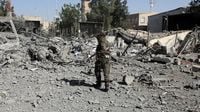Yemen's Houthi group escalated tensions in the Middle East on Friday, May 9, 2025, by launching a "hypersonic ballistic missile" aimed at Israel's Ben Gurion Airport, as well as conducting a simultaneous drone strike on a military facility in Tel Aviv. This attack comes just days after a ceasefire agreement was announced between the United States and the Houthis, mediated by Oman, which did not include any stipulations regarding Israeli targets.
The missile launch, which occurred at approximately 4:24 PM local time, triggered air raid sirens across central Israel, leading to widespread panic as millions sought shelter. Houthi military spokesperson Yahya Sarea claimed that the missile disrupted operations at Ben Gurion Airport for over an hour and forced "millions" into shelters. However, these claims could not be independently verified.
Despite the Houthi assertions, the Israeli military reported that their air defense systems successfully intercepted the missile. An Israeli defense source indicated that the missile was downed by the Arrow long-range missile defense system, although a U.S.-supplied THAAD interceptor, deployed to assist, failed to hit its target. This marked the second failure of the THAAD system within a week, as it had also missed a missile on May 4, which struck the grounds near Ben Gurion Airport.
Israeli Defense Minister Israel Katz reaffirmed Israel's commitment to respond forcefully to Houthi aggression, stating, "The Houthis continue to launch Iranian missiles at Israel. As promised, we will respond strongly in Yemen and wherever necessary." This sentiment echoes a broader strategy by Israel to escalate military operations against the Houthis in response to their ongoing missile attacks, which have reportedly included 28 ballistic missiles and numerous drones targeting Israeli territory since March 18, 2025.
The ongoing conflict has roots in the larger Israel-Hamas war, which reignited in October 2023 following a deadly attack by Hamas that killed over 50,000 Palestinians. The Houthis have positioned their attacks as acts of solidarity with Palestinians, asserting that their campaign against Israeli targets is a legitimate response to what they describe as Israeli "war crimes" in Gaza.
In the wake of the missile attack, major airlines began suspending flights to Tel Aviv. While Ben Gurion Airport remained operational, the U.S. State Department issued advisories against travel to Gaza and Yemen, and recommended reconsidering travel to Israel and the West Bank due to the escalating violence.
Airlines such as Aegean Airlines, AirBaltic, and Delta Air Lines announced temporary cancellations of flights to Tel Aviv, highlighting the growing concerns over safety in the region. The situation has led to a significant drop in air traffic, with airlines resuming operations cautiously after previous ceasefire agreements had momentarily stabilized the area.
In Yemen, large-scale pro-Houthi demonstrations were reported, with protesters declaring their commitment to support Gaza and expressing defiance against U.S. and Israeli actions. Senior Houthi official Mohammed al-Bukhaiti emphasized that their operations would continue until the violence in Gaza ceases, stating, "Our operations will continue until the war of annihilation in Gaza is stopped." This reflects a broader sentiment among the Houthis that their struggle is intertwined with the Palestinian cause.
As the situation develops, Israeli officials have indicated plans to intensify military actions against Houthi positions, with a focus on destroying missile launch sites and critical infrastructure. An Israeli defense source stated, "We will continue to strike the Houthis. We face no restrictions—the agreement between the Houthis and the Americans does not bind us—and they will pay." This commitment to military engagement suggests that the conflict may escalate further, with potential implications for regional stability.
In summary, the missile strike on May 9 represents a significant escalation in the ongoing conflict between the Houthis and Israel, further complicating the already volatile situation in the Middle East. With both sides preparing for continued hostilities, the potential for broader conflict looms large, raising concerns among international observers and regional stakeholders.






